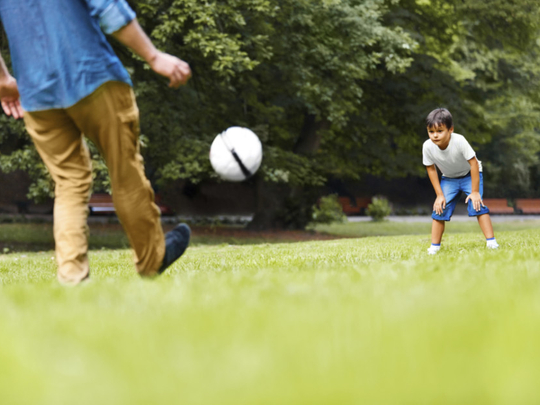
I take my children to the playground so they’ll entertain themselves. It’s not working.
I need my kids to stop playing with me at the playground.
I don’t mean I need them to leave me alone and stop smothering me in attention because I’d like 10 minutes with my phone and to wander pointlessly through the pathways. But on the other hand, yeah, that’s exactly what I mean. I need them to play tag by themselves. Climb some branches. Explore the riverbank. Find frogs. Be dinosaur robots. Anything other than standing there, pawing at my legs, scampering off then returning every 30 seconds with a command to play some game I’ve not heard of. Somehow, at ages 12 and 4, they can’t entertain themselves.
Now, please understand that the bulk of the time, I do pay attention to these people. We dance around the living room. We play chess (the 12-year-old and I, anyway; frankly the 4-year-old is not very good at it). We race. We discuss the upsetting season finale of “Star Wars Rebels”. (My apologies to his science teacher. “Sorry he’s falling asleep in the lab, ma’am, we were up late talking about Darth Maul.”)
So when we hit the playground, usually around 5pm, for what’s sometimes the day’s first episode of blue-sky free play (especially for the oldest, who’s often coming from swimming practice or an orthodontist appointment), the implicit idea is that they will go play on their own. Because grown-up days are busy too, and sometimes Daddy needs to just sit here and stare at the mulch for 10 minutes. Really that is all I am doing. One day you guys will understand.
In my defence, their games are the opposite of fun. Games are enjoyable when they have clearly stated objectives and goals. Such as tag. Or batting practice. Or Battleship. Or blackjack. The 12-year-old just wants to play Calvinball. It’s a fictitious game invented in “Calvin and Hobbes”, in which Calvin and his stuffed tiger make up arbitrary rules and point totals as they go. In the comic strip, Calvinball is precious, thoughtful commentary on how the rigidity of traditional sports stifles imaginative minds. In reality, it’s a waking nightmare that usually ends with me losing 100,000 points because I give up and start texting people whose responses arrive in English.
It goes on like this. The oldest wants me to play something involving spies, the youngest is 50 yards away and in sobbing need of a push. The oldest asks what my dragon looks like. (I was unaware I owned one.) The little one wants to serve imaginary cheeseburgers out of the plastic play set. No, not those cheeseburgers. No, those are fries. No, Daddy you’re not doing it right!
I realise I will regret this column in the exceedingly near future. I’ll look back fondly on these days when they are in high school and are out with their fool friends and their drivers licence, or upstairs huddled with some device designed to circumvent me, or while closing the van after packing the college boxes. I know that time is fleeting, impossible to touch and the only thing worth preserving. I know it’ll soon be gone.
I also know that, for a few hours after the 2.30pm bus drops him off at home, the 12-year-old prince of my heart and song of my soul speed-reads “Garfield” comics to me nonstop. No, really. For hours. This is not an exaggeration. He also fires off important questions about which lightsaber is my favourite, and if we have any purple Gatorade, and what colour water is. (If he opens up Minecraft? Forget about it.) There’s also drop-off and pickup and lunch-making and swim-bag packing and, in between, me working so he can afford those “Garfield” books.
Which is why we hit the playground, the great equaliser. Delightful chaos. Anarchy within structure. A place where bonds are made and broken and injuries are generally temporary. A practice shoot-around for life. Also a place where people who have already played the real game can get in six minutes of Words With Friends time.
But after it happened a few times, I started to worry. Is this my fault? Had I not nurtured their real-world creativity enough? Taught them to play tag, to spin their own, uh, playground spinny things? Had our parental showering of attention — which is demanded by 98 per cent of all parenting books and 103 per cent of other parents — left some empty space where their physical imagination should be?
Naturally, this consumed my thoughts for probably about 10 minutes, until it occurred to me that I’d been looking at my phone for a good 10 minutes. That was too long. I looked up, and there was my oldest hiding in a little makeshift playhouse, poking his head around a window, putting his finger to his lips to indicate “Quiet!” while scanning the playground for the Seeker. And there was the youngest, climbing on a dinosaur-shaped jungle gym that I actually didn’t know he could navigate by himself. And in that moment, one thought, one loud thought went clattering through my head: “Aw, they don’t want to play with me.”
–Washington Post









